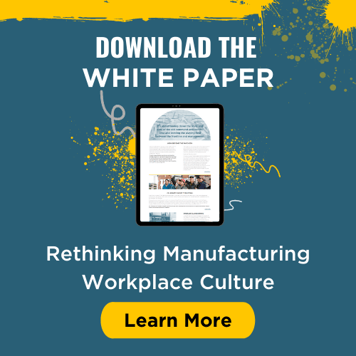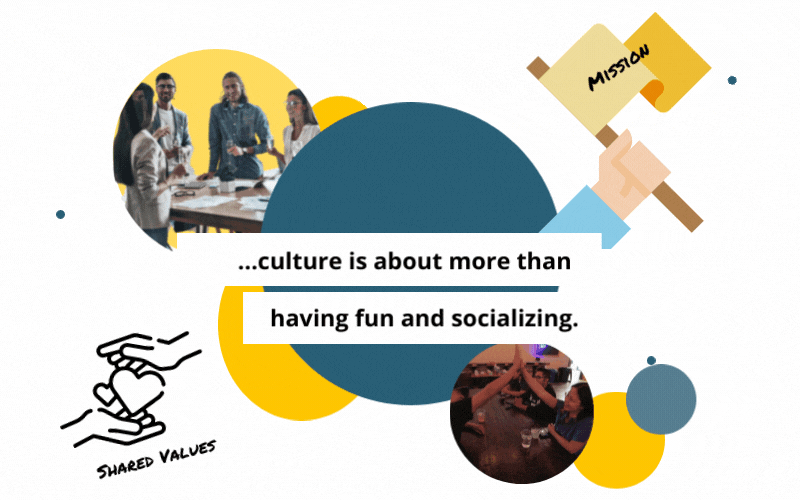The Difference a Great Culture Made in My Job Satisfaction (And Why That Matters During a War For Talent)
.png?width=790&name=Blog%20Header%20(3).png)
Like so numerous staff leaving their positions throughout The Terrific Resignation, I wished it all.
Increased fork out, distant perform, and a adaptable plan ended up possibilities my former posture in a non-financial gain couldn’t present, so I recognized a new career I realized had these positive aspects.
But here is the plot twist: After 6 months in my new function, I’m on the transfer once again. As it turns out, I benefit a firm’s tradition just as a great deal as I worth overall flexibility. The non-income I remaining (soon after five years) provided an outstanding society that my new work lacked.
<< Transform your company's culture with a business coach.>>
The lifestyle at my previous job gave me a robust feeling of belonging and wellbeing, and I dependable the leadership workforce. When doing work at my new work, I never felt like I in good shape into the tradition. I often felt nervous and stressed, and from time to time puzzled if management had my ideal interests at heart.
I had to talk to myself, what was so distinct about the non-financial gain tradition?
Doing work towards a humanitarian mission helped—the coworkers and leadership were very compassionate and mission-driven. But there was a different frequent thread—both companies adopted a enterprise model named The Excellent Sport of Business enterprise®—and its guiding concepts assisted them make a society I drastically missed after leaving.
Why Work Pleasure Matters in 2022
My working experience aided me recognize that tradition is a offer-breaker for me when it arrives to position fulfillment.
But why does work gratification matter? Simply because firms are engaged in a “war for expertise,” and if they want to get, they’re going to have to listen to staff like me.
And workers like me aren’t happy.
According to a recent work fulfillment study conducted by Business enterprise.com, “Only fifty percent of personnel are glad with their present positions. Another quarter are neutral, and 26 p.c are dissatisfied.”
.gif?width=1200&name=Job%20Satisfaction%20Stat%20(1).gif)
And lots of of us are on the go. The very same study goes on to say: “Much more than 60 per cent of those people at present used are trying to find new jobs or will begin browsing within the following six months.”
That’s the poor information for companies because, in the latest work sector, workforce have all the leverage—if we are not joyful, there are lots of other selections.
But here is the fantastic news: For the reason that we have leverage now, we are speaking loudly about what will make us happy—and all employers have to do is pay attention.
The Cultural Components I Missed Most
Considering that tradition is a deal-breaker for me now, I put in a ton of time reflecting on accurately what I liked about the cultures I thrived in. I narrowed them down to 4 elements—collaboration, openness, possession, and enjoyable.
Collaboration
At the new firm, there wasn’t a perception of collaboration on troubles outside the house of our possess office. It was like each individual office was doing the job toward painting their individual tiny photo of achievements. But we weren’t painting one large photograph as a company.
I typically felt by itself with my issues. Perhaps I would achieve out to a few of group members for assist, but the difficulty hardly ever designed it out of my own office.
I remembered an working experience I experienced though functioning as the Volunteer Coordinator at just one of the non-profits—a domestic violence shelter. We ended up going through a critical volunteer scarcity owing to the COVID-19 pandemic. My abdomen sank as I checked my electronic mail and voicemail each individual working day, obtaining much less and fewer inquiries about volunteering.
I felt the fat of the issue on my shoulders. But I felt a wave of aid when I remembered our team’s method for resolving problems.
Since this non-profit performed The Good Recreation of Organization®, I knew that each Wednesday, we’d have our weekly Huddle—a 30-moment assembly with all people in the group. For the duration of this assembly, we would assessment our scorecard–a record of essential financial and assistance-associated quantities we would discovered as essential to our achievement.
We’d evaluate the quantities and then open the table to explore any difficulties possibly blocking us from meeting our ambitions.
Within two months of voicing my worry about the volunteer lack for the duration of Huddle, our whole team was mobilized. A plan was developed to systematically resolve the dilemma by a MiniGame™—a brief-time period, engaging activity built to pursue an prospect or suitable a weak spot in just the company.
Our group created a MiniGame™ each and every quarter in the course of the year—and this established a robust lifestyle of collaboration across departments on an ongoing foundation. This collaboration meant none of us at any time had to really feel like we had to solve a dilemma by itself.
Openness
At the new enterprise, I was hardly ever fairly positive how we were being undertaking fiscally. The standard manager would report some particulars in the course of a month to month all-personnel conference, but, as an entry-level staffer, I was generally in the darkish. 
This uncertainty developed emotions of disconnection and often fear—can they find the money for to retain me as an personnel? Can they find the money for to hire another person to share my workload? If there was a key difficulty, would I locate out about it proper away or be blindsided?
Both non-earnings I worked for were fully commited to opening their guides. We commenced each individual year by location fiscal and company-connected goals—called our Significant Numbers—and every team member in the agency was included in this process.
Just about every 7 days at our Huddle, we’d review the numbers—so each individual staff member was in the know about just in which we stood financially. This clarity constantly built me sense extra secure, even when the figures were not great. Our weekly and month-to-month “forecasting”—looking ahead and speaking interdepartmentally to forecast fees, intended that we had been prepared for potential worries.
What struck me most have been the main values that our leadership crew represented through their observe of open-book management: believe in, honesty, and transparency.
By opening the guides, they were indicating to each individual employee—we believe in you. We need you to know these aspects so we can all get the job done with each other to carry out our mission. This fostered my have confidence in in leadership.
Line of Sight
Due to the fact I was not aware of any economic ambitions at the new business, I also wasn’t aware of how my work could add to assembly them or how the objectives benefited me as an personal employee.
At the non-revenue companies, I was not only offered fiscal particulars but I was also taught by management how to interpret and recognize the numbers.
Leadership took the time to offer fiscal literacy instruction to all staff members. This education was meant to empower us to choose ownership in just our roles and to aid us established intelligent, workable aims for the company.
This meant I failed to just know our agency’s goals—I assisted generate them, and so I felt responsible for my element in conference them every year.
A reward system was also a portion of my do the job at the two non-income agencies—if we hit our Important Number™ aims at the close of the yr, each and every a single of us gained a reward, and we all celebrated our gain jointly.
This is what The Fantastic Video game of Business enterprise refers to as providing staff A Stake in the Result®—and it served me feel like my challenging operate was staying recognized and rewarded.
Pleasurable
Don’t get me erroneous we had entertaining at my new job. There were being regular monthly group lunches and holiday parties.
But in concerning people functions, the day-to-working day operate ecosystem was not far too thrilling.
At each non-revenue, even the weekly all-staff members conferences (known as “Huddles”) have been enjoyment.
Every single year as a part of The Fantastic Recreation of Company®, our team resolved on a theme for our Match. We built our scoreboard around the concept, created catchphrases close to it, and applied it to shade all our celebrations and routines all over the year. The theme could be anything at all from pop lifestyle to films or audio.
.jpg?width=712&name=Malco%20Team%20(1).jpg)
A person 12 months, our concept was The Wizard of Oz, and at weekly Huddles, our Finance Director would toss Ding Dongs at team associates who gained praise or recognition (Mainly because ding dong, the witch is dead?) We might giggle as she’d chuck them at us, seeking to capture or duck and dodge them.
Another year we chose “Lego Motion picture” as our topic, and we constructed our scoreboard fully out of legos. We’d normally sing “Everything is Wonderful” when anything fantastic occurred.
These enjoyable times took place all through do the job itself, not just throughout scheduled functions. Joy and playfulness have been a part of working day-to-day lifestyle.
What I Figured out About Lifestyle
This most important takeaway from my encounter moving from a single culture to another—is that culture is significantly less about prepared parties and much more about shared values.
Does it genuinely make any difference if your split space has beer on tap if your workforce truly feel disconnected on a each day foundation?

The lifestyle of openness and process for collaboration at the non-profits I worked for intended far more to me than any social celebration or “perk” ever could. It produced my work everyday living superior on a working day-to-day foundation.
As a employee on the shift, I even now want it all. But that suggests the two flexibility and a wonderful society.
Companies will need to present this to get and keep employees in the course of the war from expertise in 2022.
And those people who undertake enterprise models like The Great Recreation of Business® to assistance generate an superb society will have the gain.



